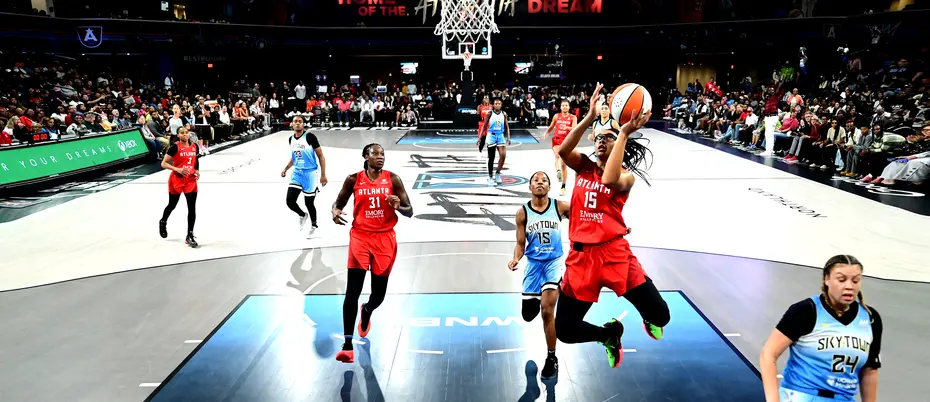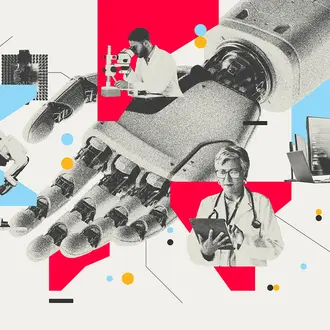Leadership
How to build a winning team, on or off the court
Here’s how to align talent, culture, and strategy to create lasting team success, according to private equity exec and WNBA franchise CEO Suzanne Abair.
What does it take to build a winning team on or off the court? How do you align talent, culture, and strategy to create lasting success?
Suzanne Abair, co-owner and CEO of the Atlanta Dream WNBA team and a private equity executive, offered leadership insights from both industries in a recent conversation with Rob Dietel, senior director of executive education at MIT Sloan.
Real estate and women’s professional basketball might not seem to have much in common, but the view from the executive suite is similar in both realms, said Abair, who is president and COO of Northland, a real estate private equity firm with $8 billion in assets under management.
“Basketball is a team sport. Business is a team sport. … I’ve always felt that the team dynamic has been so important to who I am as a leader and the way I like to lead,” said Abair, a longtime attorney and athlete who grew up playing softball and rowing crew.
She detailed four leadership lessons from her perch at the top of two high-performing organizations.
Hands-on employee engagement matters
At Northland, Abair oversees some 650 employees across 16 states. A culture of shared values bridges the geographical gap. As a longtime corporate attorney new to commercial real estate when she joined Northland in 2004, Abair gained trust by personally meeting with each employee to make them feel valued.
“I visited every single one of our properties. I wasn’t going out to see the assets or the financial performance. I could get those reports at any point in time. Over a year, I made a point to meet every single one of our employees and ask them for their feedback,” she said.
Specifically, Abair asked four key questions:
- What’s it like to work here?
- What can leadership do to make the experience better?
- What do you wish you could share with the corporate office?
- What can leadership do to make employees feel more connected to the company?
Similarly, Abair sought to turn the Atlanta Dream into what she calls an “employee-focused” organization. “When I moved into sports, I [thought], ‘Wow, this is really still a male-dominated industry,’ although you’re starting to now really see change,” she said.
“At Northland, we had undergone a concerted effort to coalesce around shared values, to build an inclusive environment where everyone felt like they could come in and be their authentic selves, and where everyone felt like they could be heard,” Abair said. “And so those values became critical to us when we were starting to build the Dream.”
At both organizations, “I make sure that people know that I have an open-door policy, so if something comes up, people don’t have to wait; they can just come find me,” she said.
Don’t just communicate change; explain why it needs to happen
Real estate and sports are both vulnerable to quick fluctuations: in market prices, consumer demand, fan response, and team performance. That often requires management to course-correct — and to make sure team members understand what’s happening.
“The most important thing about change is being prepared with a good communication plan,” said Abair, who favors straightforward, frequent communication explaining the reasoning behind decisions to elicit buy-in.
Whether it’s implementing smart-home technology in Northland properties or making a player trade on the Dream, “you have to make sure you have the buy-in of people who are going to be most impacted by change. You can probably never overcommunicate when you’re going to change, and you have to give the ‘why’ so that people understand why we’re making the change,” she said.

Women's Leadership Program
In person at MIT Sloan
Register Now
Teams, not sole contributors, create lasting impact
In response to a question from the audience on how the “superstar effect” can impact teams, Abair said she focuses on group effort, not on individuals, in both her roles.
“While I would never deny the impact that Caitlin Clark has had on women’s professional sports and certainly not on the WNBA, she hasn’t done it alone,” Abair said. “Who doesn’t love rising stars in their organization? But it’s about building teams. Caitlin can’t play a game alone. She has to have four other people on the court with her.”
And when Northland employees gather for their annual company luncheon, Abair makes sure to reinforce that foundational message.
“I want employees to understand that without them, there is no Northland. We can buy the best real estate assets in the country, but we operate everything we own, so every employee needs to understand that they are equally as important as I am in the organization,” she said.
Abair devotes considerable resources to providing training pathways for employees to climb the ranks, from time management seminars to leadership development. The company also offers tuition reimbursement programs.
“If you’re going to ask a lot of your employees, you need to be providing them with the opportunity to advance and grow within the organization,” she said. “Your employees have to feel that you’re investing in them.”
Authentic leadership drives success
Asked what guidance she would offer young professionals, Abair said, “Be your authentic self. Be comfortable in your own skin. Don’t think you need to be somebody else when you come into the workplace.”
It’s advice that Abair herself had to grow into. “Someone gave me that advice years ago [and] I thought it was a little bit dicey at the time,” she recalled.
The time was the mid-1990s, when Abair was a new, gay, female employee in a male-dominated industry. She asked a female mentor for advice on how to be successful at the new law firm. “I was thinking she was going to tell me, ‘Work with this person; work with that person.’ But she just said, ‘Be yourself.’
“That was really good advice, because it’s difficult to be your best if you’re trying to be somebody else or if you’re trying to do something differently,” Abair said. “I think we are all at our best when we can bring our best selves to work. Find a work environment that allows you to be yourself.”





